Poverty Stops Here
The Favor
Hey! Remember me?
Well, I just wanted to share another quick story about what it is like to work with the Leadership Development Program* (LDP) grads.
Something that I have learned in my job is that I’m not necessarily supposed to meet every need but to find people who can. In that way, I serve more as a catalyst than anything else. I guess the way I see it is — if no one else can do it, then I am able!
 So that is what happened when Richmond Wandera, LDP grad and Moody Scholarship recipient, was headed to the United States to begin his studies.
So that is what happened when Richmond Wandera, LDP grad and Moody Scholarship recipient, was headed to the United States to begin his studies.
I had arranged all of Richmond’s travel plans but hadn’t been able to find someone to pick him up from Denver International Airport. However, my husband and I were available, so we headed off for what turned out be quite an adventure.
Richmond had been traveling all night with no rest. He flew into Denver from Uganda, by way of Belgium, to spend a few days at the Compassion Global Ministry Center before heading to Moody. All of the belongings he would need for the next three years were in his possession. He was leaving behind his family, and we would later learn, his girlfriend whom he intends to marry.
I made a sign that said “Welcome Richmond” because I didn’t know what he looked like, only that his skin was brown, and I figured he would look lost.
I pressed my way to the front of the crowd waiting for incoming passengers and proudly held up my sign, while my husband, Andy, sat back and laughed at me — not wanting to be associated with my dorkiness.
I actually saw Richmond immediately. He did look somewhat lost, yet he also appeared totally confident as he headed up the escalator and immediately saw my sign (he said later that my sign meant a lot!).
Andy and I got out from the crowd and both hugged and welcomed Richmond. We chatted politely about his flight and went to look for his bags, which we learned were lost in transit. Figures! We filed a claim for the lost bags and prayed they would be located.
Richmond was hungry, and Andy and I had waited to eat, so we attempted to ask him which kind of food he would like. He said Mexican, so we went to Chipotle — I mean, what better Mexican experience is there?
He was amazed at the amount of food and could not get over the fact that refills on Coke were free. (I’ll try to get him to tell you that story.)
It was at Chipotle when I realized that we were on holy ground, because Richmond was such a joy and a delight for us to spend time with.
After dinner we headed back to Colorado Springs. About 25 miles from the airport, baggage services called to tell us that Richmond’s bags were (miraculously) at the airport. So we turned around and went to get his bags.
Let me just tell you that by this point I was grateful I would get another 50 minutes with this guy.
Richmond is kind and gracious and had no problem answering all of my 1,000 questions, even though he had been traveling for who knows how many hours.
He shared openly about the struggles he grew up with and the help that Compassion brought to his family and his community.
I think as a Compassion sponsor it is a special thing to hear first hand about the work that Compassion is doing. That’s why, even as a Compassion employee, I felt it was such a blessing to be with Richmond.
All year long we send in our $32 a month and get our letters — but to HEAR it! To SEE it lived out in someone who has overcome! It was an overwhelming experience of joy, and I know my husband and I are forever changed.
The reality is that I thought I was doing Richmond (and God) a favor by picking him up from the airport on that day. What I learned is that God was doing me a favor by giving me time with one of His kids — one who He is madly in love with.
I hope that you someday too will have an opportunity like this . . . and I’m pretty sure that if you keep reading this blog — you may! 🙂
*This content honors our historical Leadership Development Program. To learn more about our current youth development opportunities, click here.
Continue Reading ›A Chance to Survive
Hello Compassion Blog readers.
Sorry I haven’t contributed much lately. I’m still here and still handling crisis communications, in case you were wondering. There is something that has been on my mind that I feel compelled to share with you.
I’m gonna step outside my comfort zone for a minute to share this with you. I have Rheumatoid Arthritis. I was diagnosed with it when I was 15, so I’ve had it for half my life, but you’d probably never know it if you met me. I don’t talk about it much. Most people I interact with on a regular basis don’t even know. In the past 10 years, the medical research and pharmaceutical industries have come a long way in treating the disease, and this has allowed me to live to a virtually pain-free, symptom-free life.
But here’s the thing. I have a normal life simply because I happen to have been born in the United States. I have access to powerful drugs. I have insurance to cover the (outrageously high) cost of them. Certainly I am grateful for this, but lately I’ve been thinking about what my life would be like if I were born into poverty in a developing country. What if I was from rural Rwanda? Or a slum in the Philippines? Or a poor community in Nicaragua?
I’d more than likely be totally crippled by now. At 30 years old.
This thought really freaks me out, to be honest with you. I cannot imagine what it would be like to not be able to stand up straight, to walk, or to grip things. To live in constant, life-altering pain. I feel guilty for being happy I was born here. I don’t have to try to live with this disease without the help of drugs. I am not crippled. I assume it’s similar in a way to the guilt a person feels when they survive a car accident where the other passengers died . . . the ugly injustice of it. I understand that God’s ways are higher than our ways, but I struggle to understand why He chooses for some — why He chose ME — to be born into affluence and why He chooses some to be born into poverty. It’s not fair.
Nowhere is this injustice more evident than in the fight against HIV and AIDS. December 1 was World AIDS Day, and Brianne told you about our AIDS Initiative. The amazing thing about this program is that it literally restores justice to an unjust world. Without access to antiretroviral drugs, those battling AIDS in poverty-stricken countries fight an unwinnable war. By providing the antiretroviral therapy, Compassion allows children with death sentences another chance at life. A chance that, had they been born here, they would have had simply by virtue of their nationality.
If anyone is in the position to get this, it’s Godfrey. He understands that he is alive today because Compassion is fighting the injustice of HIV and AIDS in Uganda. His life is his testimony.
Compassion’s AIDS Initiative is more than just drugs. It’s nutritional support. It’s the critical laboratory testing. It’s psychosocial support. It’s treatment of opportunistic infections. It’s transportation assistance. It’s income generation. It’s housing repair. It’s all the opportunities that a person suffering from HIV here in the U.S. would have.
The AIDS Initiative essentially levels the playing field to give every victim of HIV — no matter where they were born — an equal chance to survive this devastating disease.
Give someone a chance to survive by supporting the AIDS Initiative today.
Visiting Uganda
Below is an excerpt from an e-mail that Paul Moede, the leadership development marketing director for Compassion U.S., sent to his family last week and also shared with his co-worker, Gayle White.
Paul is currently traveling in Uganda.
Today we visited a child survival program deep in a rural area. Sometimes it boggles my mind to see the joy of little kids who see a bus. They run alongside the road waving and laughing. Closest I’ll ever be to a rock star. Unbelievably chaotic roads, traffic that is harrowing and market stalls that defy description. Sides of meat hanging in the sun. . . . fresh fruits and vegetables . . . and people thronging everywhere.
Thought I would tell you about a home visit today with a single mom and three children — and infant and two toddlers. The mom, Sauda, has recently been abandoned by her husband, and has no source of income at all — just a plot of garden from which to feed her family. I could tell you more, such as the day her mud and thatch hut caved in on her from the rain and she had to build a new hut by herself. About 7′ by 12′ for four people.
After we spent time with her, we left gifts for her children as well as a tub and bag of staples. Never in my life have I seen such a response to a gift — joy that she could not contain. She covered her face as she knelt before the food and started to sway back and forth. And then she erupted from the ground, raised her hands and started dancing. Now I’m not talking about subtle. I mean clap your hands, shake your booty, turn and sing at the top of your lungs dancing. And she went on for two minutes. The joy was so contagious all we could do was clap along with her and choke back the tears.
Unbelievable.
Anyway, all is well. The poverty and chaos is bleak. The infrastructure is rotting away, but the church gets things done.
Paul
Mistaff Meets His Sponsor
Stories and photos By Consodyne Buzabo, Compassion Uganda field communications specialist
An air of anticipation and excitement hung over the Muzahura Child Development Center on the morning of August 26, 2008. While any day at the child development center is always a day the children look forward to each week, this day was going to be extra out of the ordinary.
Special guests were coming to visit. On this day, 13-year-old Mistaff had a mixture of trepidation and expectancy coursing through him. Questions swirled through his mind. “What would they think?” “What do they look like?” “What will I say?”
On this bright and sunny day, Mistaff was waiting to meet his sponsor for the very first time. (more…)
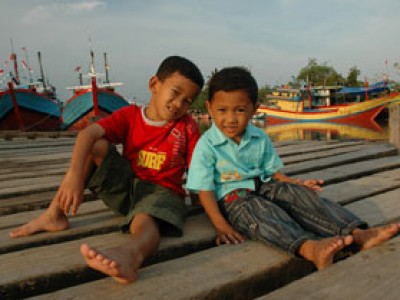
The Dignity of Work
I told you about my new neighbor, the Port-o-Let. One morning, a new big truck came pulling up outside my apartment, and this guy in a yellow vest hopped out.
Armed with a long hose, he proceeded to suck the contents out of the Port-o-Let. Quick as lightning, he hopped back in his truck and was off. Now he’s been showing up in his big green truck each week, happily performing his duty.
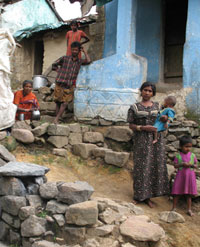 And it got me thinking. It’s easy for me to complain about the little parts of my job that bug me (like paperwork and deadlines and meetings). Watching this man gave me a new appreciation for my job. Not, by any means, that I think there is more dignity in what I do than what he does. I believe that there is dignity in the work that God has given each of us to do, no matter how our culture prompts us to view it.
And it got me thinking. It’s easy for me to complain about the little parts of my job that bug me (like paperwork and deadlines and meetings). Watching this man gave me a new appreciation for my job. Not, by any means, that I think there is more dignity in what I do than what he does. I believe that there is dignity in the work that God has given each of us to do, no matter how our culture prompts us to view it.
And learning more about the work others do around the world can give us a new perspective on our own work.
Ganesan, shown here with his family in front of his home in India*, works each day as a day laborer in other’s fields to feed his wife and two children.
Working as a day laborer is a common occupation of the parents of Compassion children, as most can’t afford to own land themselves and don’t have the education to seek other employment.
Ganesan earns about 450 Rupees a week for his work — about $10.
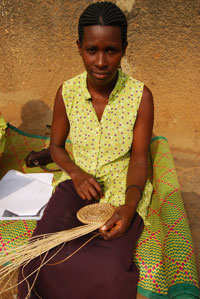
Resty is a proud mother of two in Uganda.
Her husband is an alcoholic, so a lot of the time she has to find ways to provide for her children by herself.
She hadn’t worked before, but through the Child Survival Program, she learned how to start a small business, selling charcoal by the roadside.
She gets about 20,000 Ugandan shillings a month selling charcoal — about $12.
She also learned to weave baskets through the CSP, and sells each basket she makes for about $1.
Ryan and Axl’s dads work as fishermen in Indonesia. (And, yes, that is as in Axl Rose. His dad liked rock music.)
Their fathers leave for the ocean on fishing expeditions and are gone from their family for six weeks at a time catching mackerel.
Each trip, they earn roughly 700,000 Indonesian Rupees — about $77.
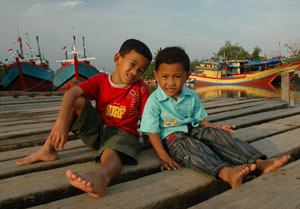
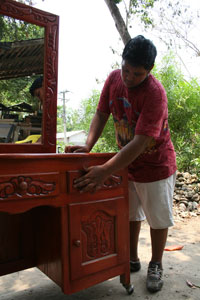 Where 17-year-old Ezequiel grew up in southern Mexico, the average worker earns $12 a week, working 20-hour days to harvest mangoes and bananas.
Where 17-year-old Ezequiel grew up in southern Mexico, the average worker earns $12 a week, working 20-hour days to harvest mangoes and bananas.
But Ezequiel’s dad is a carpenter who makes beautiful furniture.
At his Compassion child development center, Ezequiel learned how to carve wood, and together with their different skills, Ezequiel and his dad can make pieces like this dresser they just finished.
Once he graduates, a skilled woodworker like him can earn up to $55 a week, compared to the $12 of the day laborers harvesting mangoes.
In India, Suren and his wife, Rinu, both used to work full time in a brick factory. Suren lived in a dormitory at the factory, and Rinu would travel home each day to care for the family. Put together, they earned roughly 250 Indian Rupees a week — about $6 — for their family of six.
But Kajali (in the dark blue sweater) became sponsored, and her sponsors gave them a family gift, with which they bought a cycle van.
Now Suren earns many times over as a cycle van driver what he used to earn at the brick factory. When he was working at the factory and couldn’t provide a proper home for his family, Suren says, “as a parent, I felt worthless and of no good use.”
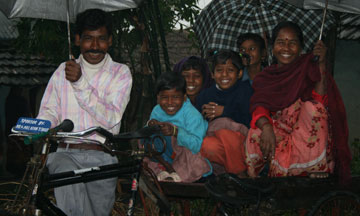
Those words tear my heart, and it’s sadly not the first time I’ve read the sentiment. How many mothers and fathers are out there, working so hard each day as farmers, drivers, and traders, scraping to provide just one or two meals for their children, and still feeling like failures?
Yet it’s so encouraging to know that even a small gesture can transform a family’s life. Suren is now filled with pride for the way he can care for his family. He says, “through Kajali and her beloved sponsor, we have now tasted of the goodness of God’s awesome power.”
<hr/ >
*NOTE FROM EDITOR: This content honors Compassion’s historical work in India. While we no longer have an India sponsorship program, we are grateful for the lives changed and meaningful work achieved through our sponsors and donors in our nearly 50 years there. For a detailed explanation of the end of our sponsorship program in India, please visit: compassion.com/india-update.
10 Questions With Dennis Tumusiime
10 questions? Yes. You asked ’em.
10 answers? Yes … kind of. They’re just not all in this post.
Here we go. 10 Questions With Dennis Tumusiime, a tours and visits specialist with Compassion Uganda.
1. Do the families that Compassion works with have a pretty good understanding about what the program entails, and are they open to their children being evangelized? Is there a balance between being so desperate that they feel they must enroll their children and thus expose them to the gospel in order for them to be educated and fed? (Kalaya G)
I’d say that 80 percent of the communities where child development centers are located have an understanding [at least partially] of our program components. There have been instances where children are denied the benefits of the programs by their parents because the parents have different beliefs and norms, but like you said, they are compelled to enroll the children because of lack of supplies to the children’s needs.
2. What are the qualifications for the project workers to work at the child development centers? (Kayla)
Each position, be it health, finance, or sponsor donor ministry has a professional element that an aspiring candidate should have. But Compassion also has a holistic approach to the work we do, and the same idea applies to the workers in the child development centers; they should be holistically qualified –- not just academically qualified. The applicant’s spiritual status matters, and it is paramount.
Ask the Field: Uganda and the Philippines
Have you ever wondered what it’s like to live in the country where your sponsored child lives? What it’s like to work for Compassion? What gets the people going who do this work each day? If so, now’s your chance to “Ask the Field!”
Ask your burning questions of our staff from around the world about their country, their work — whatever you want to know. I’ll choose 10 of your questions for them to answer. (Being the protective mother bear that I am, I’ll make sure to choose culturally appropriate questions. What’s polite dinner conversation in the U.S. may not be appropriate in their country, so keep this in mind as you ask.)
I’d like to introduce to you Dennis Tumusiime and Edwin Estioko.
 Dennis is a native of Uganda and works as a tours and visits specialist for Compassion International Uganda. (Did you know that Compassion doesn’t send a bunch of Americans over to other countries to minister to the children, but works through natives of that country so they can culturally contextualize the ministry? That’s pretty cool.) Anyway, Dennis has been working for two years with Compassion to coordinate and plan visits from sponsors and donors to Uganda. (So, if you visit Uganda, you’ll probably get to see that smiling face!) Coordinating all these trips means he’s quite an adventurous man.
Dennis is a native of Uganda and works as a tours and visits specialist for Compassion International Uganda. (Did you know that Compassion doesn’t send a bunch of Americans over to other countries to minister to the children, but works through natives of that country so they can culturally contextualize the ministry? That’s pretty cool.) Anyway, Dennis has been working for two years with Compassion to coordinate and plan visits from sponsors and donors to Uganda. (So, if you visit Uganda, you’ll probably get to see that smiling face!) Coordinating all these trips means he’s quite an adventurous man.
 Edwin Estioko began working for Compassion six years ago and is originally from Quezon City, Philippines. He is Compassion’s Field Communication Specialist in the Philippines and writes stories about and takes pictures of the ministry that is happening through Compassion International Philippines. He is married with no kids, so he and his wife can easily consider all the Compassion children as their own.
Edwin Estioko began working for Compassion six years ago and is originally from Quezon City, Philippines. He is Compassion’s Field Communication Specialist in the Philippines and writes stories about and takes pictures of the ministry that is happening through Compassion International Philippines. He is married with no kids, so he and his wife can easily consider all the Compassion children as their own.
Dennis and Edwin are excited to answer your questions, so ask away!
A Smart Risk
Shaun Groves wrote this post. It’s been approved by the powers-that-be.
Be careful going around having ideas and talking about them. You might just get put to work. That’s what happened to me.
About a year ago, I think it was, I started talking to the folks at Compassion about a crazy new idea. I wondered if they could spread the word about their ministry to children through bloggers the way the Compassion message has been spread through artists and speakers for decades. I proposed Compassion take bloggers on a trip to see the ministry for themselves and, of course, ask them to blog about what they see.
When the powers-that-be decided the idea was worth trying out, a small team went to work finding the right bloggers to travel to Uganda. Then we took a very long flight to Africa together back in February, deplaned and played with children, and learned about the needs of Ugandans and how Compassion and sponsors are partnering to meet them. And we blogged. With very slow connection speeds, we blogged.
We posted pictures, stories, videos and lots of links to compassion.com. Thousands read along daily. Hundreds of children were released from poverty and hundreds of Americans were released from wealth as a result. And the Web lit up with applause.
My favorite online compliment came from a fund-raising expert who wrote:
“Looked at with old economy eyes, Compassion is taking a huge risk, letting go of its marketing to 15 different near-strangers who might do anything. Looked at with modern eyes, Compassion is smart: willing to give up control in favor of being talked about by real people.”
In other words, some institutions would call this kind of idea crazy but it worked: People are talking about children, about loving them, about perspective and grace and kindness and Jesus.
Now, when I’m not singing or speaking (or blogging), I’m working part time these days for Compassion – developing more and better relationships with bloggers.
We just launched CompassionBloggers.com where anyone can read the best posts from our blogging trips, and where bloggers can go to grab widgets and banners, apply to go on a blogging trip with us, or sign up to receive a monthly blogging assignment from Compassion.
Our ranks are growing. There are now a few hundred bloggers scattered around the world blogging on behalf of Compassion every month.
What’s next? We’re taking a bunch of bloggers to the Dominican Republic Nov. 2-7, so read along that week and pray that we assemble the right gifted team for the trip, that we’re safe and healthy while overseas, that readers are inspired and mobilized to act, and that the blogosphere is filled with talk of children and Jesus once again.
Focusing on the Leadership Development Program
I’ll start by saying this: It’s very hard to explain impact a Compassion trip can have on a person.
For most of my life, the only thing I knew about poverty was the Sally Struthers commercials. You know, those spots from the ’80s with all the slow-motion shots of children crying. I have been given the opportunity to go with a video production crew to various countries to film the work of Compassion. In some way, I expected to see this Sally Struthers image. I was totally wrong.
I’m a sound engineer for Student Life. We produce large camps, conferences and a variety of additional resources for churches. About the time I started working there, Student Life had just partnered with Compassion. Since then we’ve always had a Compassion presentation at our events, and work to educate our attendees about what sponsoring a child means.
Last year we were sent to Uganda to interview students from Compassion’s Leadership Development Program* (LDP). Our hope was that some of the students would travel with our camp teams throughout the summer and lead the Compassion presentation from stage. What better way to show the work of Compassion than to put living proof of that work on stage?
Before this trip I had already been on one Compassion video shoot, but it was a 48-hour whirlwind trip to Guatemala. It was a fast turnaround, and we were only able to see a few children. Our video focused on one child’s experience meeting her sponsor. I could see the impact Compassion was having on a single child, but what would the finished product look like? All I knew going into the Uganda trip was that LDP students had grown up through the Compassion child sponsorship program, graduated, and were then sponsored through college. These students were the cream of the crop.
 We arrived in Kampala and tried to get some rest. The next morning we had our first LDP student interview. His name was James.
We arrived in Kampala and tried to get some rest. The next morning we had our first LDP student interview. His name was James.
This was initially a typical setup for our team. We had done hundreds of interviews. What I did not know was that my life and perspective of Compassion would be changed forever by the testimony of this man.
James was more educated, well spoken and passionate about his relationship with God than I could say I have ever been. He described his childhood –- one that was riddled with loss of parents and siblings, leaving him alone to live with an aunt. He spoke of being malnourished and without hope. Then he said all that changed when he joined Compassion.
I could have probably predicted most of his interview to this point. We had asked most of the questions, and it was the picture of so many nonprofit companies and others who serve those less fortunate than most Americans. He was a child in poverty who was given a chance. It was his answer to our last question that stopped us all cold. (more…)
With God All Things Are Possible
Hey! I have new photos of Amisi. I was so blessed to meet him on my trip to Uganda last month.
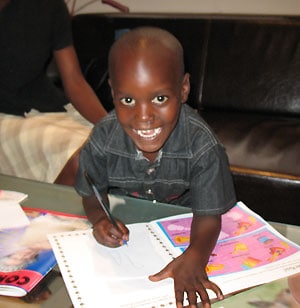
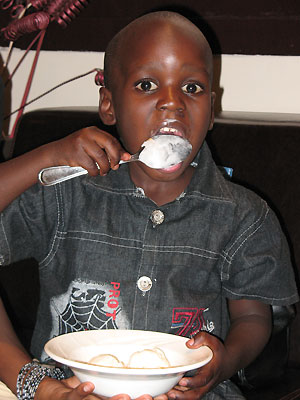
I was told the outfit he’s wearing, along with his shoes and socks, were purchased through the Christmas Gift Program.
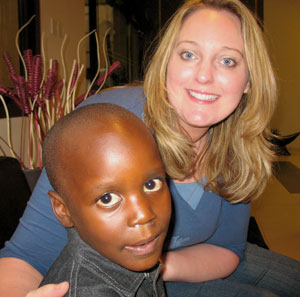
During my visit, I also gave him a banner that says, “With God, all things are possible.” As he grows up, I hope he clings to this message. I can’t wait to see how God works in his life. He may be living in a poverty-stricken African village now, but with God, the possibilities for his life are endless.
Have you visited your child? I’d love to hear about it. Leave a comment and tell me!
And if you have any photos, add them to our Flickr group. Be sure to include brief descriptions and I’ll share some of them here in a few days!
A Mosquito Bite Away
One of the things that shocked me when I visited Uganda last month was finding myself scared to death of mosquitoes. It was the strangest feeling to be afraid of something so small — something we usually think of as just a pest. But in Africa mosquito bites don’t just make your arm itch — they kill.
Malaria, which is transmitted by infected mosquitoes, is killing one million people a year. Most of these are children under age 5 in Africa. That’s right. Malaria, which is preventable and treatable, is killing more than 750,000 children a year in Africa.
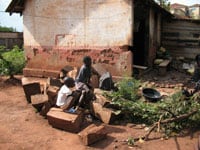 Before visiting Uganda, I never really understood how mosquitoes managed to claim so many lives. But when I visited homes there, I understood. Many of the houses don’t have doors — just sheets covering the openings. And the windows are usually bare, too. So at night, the mosquitoes help themselves.
Before visiting Uganda, I never really understood how mosquitoes managed to claim so many lives. But when I visited homes there, I understood. Many of the houses don’t have doors — just sheets covering the openings. And the windows are usually bare, too. So at night, the mosquitoes help themselves.
Catherine, a single mother I met in Uganda, told me that before Compassion gave her an insecticide-treated mosquito net, she did everything she could to protect her 10-year-old daughter, Irene. But her efforts were in vain.
“Every night, I tried to cover Irene with a blanket, but she would still get bitten all night long,” said Catherine. “I wanted so badly to buy her a net, but I couldn’t afford it.”
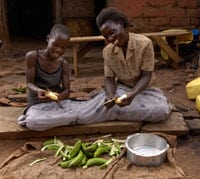 And when Irene got malaria, Catherine certainly couldn’t afford doctors’ bills. “Before Compassion, I would go pleading to doctors for help and beg to pay later,” she said.
And when Irene got malaria, Catherine certainly couldn’t afford doctors’ bills. “Before Compassion, I would go pleading to doctors for help and beg to pay later,” she said.
Thank God that Compassion intervened! Through the ministry’s Complementary Interventions Program, Irene is now getting medicine and sleeps under a quality net. Today, she’s healthy and thriving.
You can make a difference and help protect vulnerable children like Irene! Since today is World Malaria Day, take a minute to learn more about this disease and see how you can join the fight!

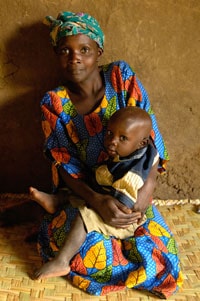 Today we visited a
Today we visited a 
